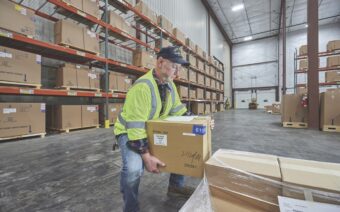
May 5, 2023
SHEBOYGAN – Some may say the best job is equal parts finding your niche and serving your community.
John Rogers said he found that sweet spot as the business roundtables facilitator for the Sheboygan County Chamber of Commerce – which he offers across eight different sectors of business and doesn’t plan to stop any time soon.
Recently, Rogers hit a pretty significant milestone in the role – the completion of his 500th roundtable.
“”(I’m) thankful for the opportunity the chamber has given me,” he said.
How it started
Rogers said he started at the chamber in 2007.
Soon after, he said the director at the time wanted him to start a CEO and company president roundtable, but when they didn’t receive much feedback, they decided to start an operations managers (now known as manufacturing) roundtable instead.
“I met with a couple of operations managers and they said, ‘This could be really great,’” he said. “We put (a handful of ground rules) together, and the first operations managers’ roundtable was in November 2007. That is essentially what launched it.”
Right away, Rogers said many major employers, manufacturers and other companies in Sheboygan County participated.
By 2008, he said there were about nine to 10 operations manager roundtables happening.
Rogers said the initial roundtables were held at Sargento in Plymouth and Rockline Industries in Sheboygan Falls.
“Neither Sargento nor the Rockline operations manager ever talked to each other, so that was illuminating,” he said. “Why would you? One makes cheese, the other one makes coffee filters (and other items).”
The odd pairing, Rogers said, made for a surprisingly good discussion.
“They saw some interesting synergy between what the two of them do in terms of packaging,” he said. “These operations managers were saying, ‘We would like our operators to be able to somehow diagnose funny noises their packaging machines were making so when they call a maintenance guy, (he) has a heads up as to what kind of tools he or she needs to bring.”
The more the operations managers talked, the more Rogers said they continued to find commonalities within their companies.
//17bec5072710cda5b8dd81b69f4c6e58.cdn.bubble.io/f1683294910071x131289022710534770/richtext_content.webpJohn Rogers
“I like to think of those roundtables as technology transfer roundtables,” he said. “Because really, what we’re trying to do is make sure everybody has a good feel for packaging or conveying or whatever other issues they might be dealing with.”
The mutual need for a better understanding of how and why the machines broke down, Rogers said, led several operations managers, maintenance employees, machine operators and class developers to create a high-speed operator training module with the help of Lakeshore Technical College (LTC).
Though the idea of the training module was well-received, he said the economy wasn’t as robust as people wanted it to be between the end of 2008 and the beginning of 2009, which led to a low number of participants.
Through the slump, however, Rogers said the roundtables continued to grow and continue.
Then, in 2014 Rogers retired.
“I thought my roundtable life was done,” he said.
That, Rogers said, didn’t last long.
Within the next six weeks, Rogers said the director at the time asked if he would want to come back, as they struggled to find someone to fill the position.
“I said ‘yes,’ but on my own schedule,” he laughed. “That (lets me) set the roundtable schedule based on my own needs… I’m doing almost 50 (roundtables) a year.”
How it works
In most cases, Rogers said most roundtables are held at a participating company – with stipulations.
“One of the ground rules of the operations managers’ roundtables was there couldn’t be competitors,” he said. “Let’s say we’re going to be at Sargento, there couldn’t be anybody from Masters Gallery Foods or Sartori at that roundtable because they didn’t want any proprietary secrets to be divulged.”
Rogers said the roundtables cover eight industries:
Operations managersSales and marketing professionalsNonprofitSafetyStrategic sourcingHR managersBusiness owner success strategy (BOSS)Worksite wellness
For the most part, Rogers said there isn’t an advance agenda prepared for the roundtables, mostly because participants will come in with an issue they want ideas for, and things take off from there.
“Is their issue something urgent and important; something that’s important, but not necessarily urgent; urgent but not important; or neither,” he said. “We always start with who you are, who do you represent and what one word expresses how you feel?”
Rogers said there have been times when even in a small roundtable, we don’t get to everybody’s (questions),” he said. “After every roundtable, I send out notes so people have a refresher as to what they discussed.”
In certain situations where a common topic comes up – such as recruitment and employee loyalty – Rogers said those tables are often held at the chamber with all companies invited.
To facilitate meaningful peer-to-peer roundtables, Rogers said he utilizes a process he learned at the Edward Lowe Foundation called PeerSpectives.
“The program is primarily for what they call second-stage entrepreneurs, which are companies that have been in existence for a while (and) probably generate about a million dollars’ worth of revenue,” he said. “I don’t use their exact process anymore, but there certainly are things I learned that I still use. One of the reasons for making the modifications is it makes the roundtables more user-friendly.”
Why it’s important
Reflecting on his recent accomplishment of 500 roundtables over the last 16 years, Rogers said it’s provided him with opportunities to develop even more friendships.
“Finding this roundtable niche has been so uplifting, so much fun,” he said. “Back in the Navy, I had a bumper sticker: ‘It’s not a job. It’s an adventure.’ I know for me, that’s what roundtables are all about. It’s not a job, it’s an adventure. And it’s a fun adventure, too.”
Rogers said he thinks the roundtables have also made a huge impact on area businesses.
“They learn a tremendous amount from each other,” he said. “And a lot of the people who come to the roundtables come almost every time.”
Rogers said students have also benefited from the connections the chamber’s roundtable program has had with LTC – including the launch of the Plymouth LTC Science Technology Training Center.
“It’s part of Plymouth High School, and the classrooms they have there now teach automotive mechanics,” he said. “One of the area employers donated a conveyor system so the kids can learn how to troubleshoot machinery. There’s also a computer classroom where kids learn how to put together all kinds of different systems. There is a big welding classroom.”
The training center, Rogers said, has helped push students forward in their careers and realize their potential.
“We had a fellow who graduated from that program in 2018 – he works for a mechanical contracting firm in the area,” Rogers said. “He said, ‘What I learned at Plymouth High School in the technology center was essentially what launched me into my career.’”
Rogers said the Plymouth LTC Science Technology Training Center was the catalyst for similar programs in other high schools, such as Sheboygan North and Sheboygan South.
“Both programs (there) are called Red Raider,” he said. “But the training equipment was so antiquated, and some of the local manufacturers said, ‘We don’t use that kind of program anymore. We’re going to give you something that’s relevant,’ so they both have big training modules.”
Roger said Sheboygan Falls High School worked with a couple of area plastic manufacturers, including Bemis, and now has rooms dedicated for students to learn how to work on plastics.
“So, there are four high schools,” he said. “And I can say the whole idea came out of the operations managers’ roundtable.”
Looking at the future
When it comes to the future of the roundtables, Rogers said he will continue to keep doing them “as long as (the chamber) lets me, and I’m healthy enough.”
“I try to keep my antenna up, and I try to be somewhat realistic,” he said.
That being said, Rogers said he has been keeping an eye out for someone to fill his shoes one day.
“There is one person who is on staff now at the chamber (I have in mind),” he said. “While there is always a little bit of hesitation with transition, I think he’s savvy enough to know how to keep the roundtable process going, and maybe even grow it.”
 Mental health resource clinic expands into new Eau Claire-based facility
Mental health resource clinic expands into new Eau Claire-based facility Grown Climate Smart, Township 23 Distillery announce partnership
Grown Climate Smart, Township 23 Distillery announce partnership








